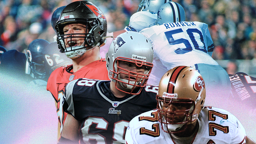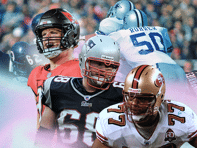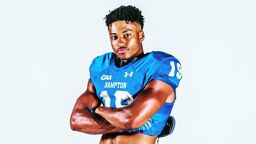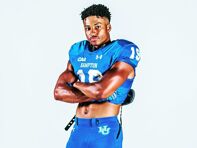Pro wrestling, like most athletic endeavors, requires a sense of self-motivation to reach the goals one sets. It is a characteristic that can be as arduous as it can be rewarding, though sometimes the two values can feel weighted to one side or another, regardless of how logical those sums actually feel in the mind.
This, among other aspects of the sometimes isolating nature that life as a pro wrestler presents, are key to the continued emergence and destigmatization of discussions about mental health within pro wrestling in recent years.
Normalizing those kinds of conversations isn’t a panacea. But doing so provides solace and space for pro wrestlers — such as out pro wrestler Mylo — to build better relationships with those kinds of thought patterns.
Get off the sidelines and into the game
Our weekly newsletter is packed with everything from locker room chatter to pressing LGBTQ sports issues.
“In this business, it’s really easy to be like, ‘I’m not doing enough’ or ‘I’m not where I want to be. Why am I not where I want to be?’ the Los Angeles-based wrestler told LGBT In The Ring. “Sometimes I really have let myself feel those emotions. I’ll let myself sit with whatever I’m feeling, but then I start to think logically and I think about when I was a little girl. What would she do if she was sitting in front of me right now, seeing all the things I was doing? She’d probably be like, ‘what the heck?’
“I have to ground myself in that way. I think everybody in this business can attest that we have our highs and lows, and the lows can feel really low. You start to even second guess like is this something that I’m sure I want to do. I feel like I’m not at all where I want to be… but then you always have to go back to that place of ‘man, I’m still following my dreams.’”
For Mylo, that journey has brought multiple championships in promotions across California, appearances in multiple states, matches in major promotions including All Elite Wrestling and a prominent spot at influential queer-owned Oakland-based promotion Hoodslam where she currently reigns as the Captain of the Champion Ship. She has also been an integral part of upstart queer-led promotion Alliance For All Wrestling in Los Angeles.
Much of what fuels Mylo is a throughline of wanting to prove people wrong, whether it be picking up and moving from her home in Virginia to Los Angeles on a whim or proving the endlessly opinionated wrestling world wrong when she steps into the ring.
“I remember working at the restaurant I worked at in Virginia and my manager said ‘You won’t last four months.’ I just love hearing that,” Mylo said with a smile. “Hearing stuff like that makes me be like ‘oh, just let me show you real quick.’ That stuff kind of fuels me. Let me just show you wrong. [In wrestling], that mean person can be me to myself, but that’s when I just say, OK, now I have to show myself.”
The desire to silence doubters and continue to learn lies at the core of Mylo’s growth. She graduated from the New Japan Pro Wrestling Academy at the same time that her star continued to rise last year. Adding to her knowledge by training under historic out LGBTQ pro wrestler and NJPW Academy head trainer Fred Rosser was eye-opening, but, more importantly, it added to the improved sense of community present in pro wrestling spaces that has helped break down gatekeeping practices and create more support amongst peers.
“I think now, being in this business, I feel more connected. I walk into a locker room and we’re all very respectful of each other and I feel like I genuinely have a good sense of friendship,” Mylo said. “If there are opportunities, someone’s like ‘oh, reach out this person.’ I never heard that before while I was training … I just feel like now it’s more of a we’re in this together and if one eats, we all eat, kind of thing.”
Check out the full interview with Mylo and other LGBTQ figures in pro wrestling on the LGBT In The Ring podcast. New episodes drop every Thursday on all podcast platforms.








































